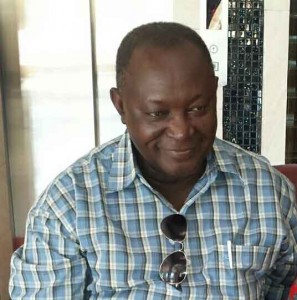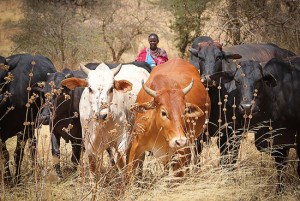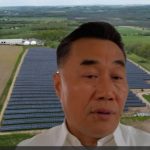By Deodatus Mfugale
Dar es Salaam, Tanzania
9 March 2016
 Climate Change has affected Tanzania in the rainy season from 2014 to 2015, according to Experts from Eastern Africa. In some parts of Singida, Dodoma, Shinyanga and Manyara regions, the semi-arid region of Tanzania, the rainy season did not start in November as expected.
Climate Change has affected Tanzania in the rainy season from 2014 to 2015, according to Experts from Eastern Africa. In some parts of Singida, Dodoma, Shinyanga and Manyara regions, the semi-arid region of Tanzania, the rainy season did not start in November as expected.
Around 70 per cent of 45 million people living in Tanzania depend on agriculture for their livelihood. But as climate change is affecting the country with deforestation and land degradation, life isn’t easy.
In the last six previous seasons, this situation has a devastating impacts on the lives and livelihoods of many Tanzanians. Dryland communities have been and are set to be among the worst affected.
These people are heavily dependent upon fragile ecosystem services for their livelihoods. But those services—from nutrient cycling; flood regulation and biodiversity to water; food and fibre, are under threat from a variety sources such as urban expansion and unsustainable farming settlements. Climate change is now aggravating these challenges. But Climate Change can be also a primary boost to development.
“Combating climate change and helping communities to adapt to its impacts represents an opportunity for new and more sustainable investments. It can also contribute to improved livelihoods, fighting poverty and enhance economic resilience among dryland communities,” says Dr Emma Liwenga, from the
Pathways to Resilience In Semi-arid Economies (PRISE) Programme of Eastern African .
A programme for sustainability
 As it written in its website « Pathways to Resilience in Semi-Arid Economies (PRISE) is a five-year, multi-country research project that generates new knowledge about how economic development in semi-arid regions can be made more equitable and resilient to climate change. »
As it written in its website « Pathways to Resilience in Semi-Arid Economies (PRISE) is a five-year, multi-country research project that generates new knowledge about how economic development in semi-arid regions can be made more equitable and resilient to climate change. »
Among other things, the eastern african programme seeks to raise the economic potential within the dryland areas. The dryland communities can take opportunites to invest for their own development. Most of the arid and semi-arid areas of Tanzania have land, suitable for small-scale farming.
« Tanzania is the largest country in East Africa, » noted the PRISE website. The country have abundant water . Communities can engage in beekeeping, small-scale mining and sunflower oil production. However the potential for economic development has not been fully utilized due to limited investments.
« Investing in the beef value chain »
There is a need to establish a tripartite relationship between government, investors and inhabitants of the drylands. It would raise funding to these areas and ensure economic resilience of the communities. At the same time, it will guarantee returns to investments.
Many dryland inhabitants are pastoralists, sedentary or nomadic, or agro-pastoralists. For many years, they have lived with variable rainfall and frequent droughts using a range of local strategies to cope with the situation. Nowadays, the situation has changed, and the traditional methods of adaptation must be enhanced in order to respond to current circumstances. « One way through which pastoralism can be enhanced is through investing in the beef value chain. Improving livestock keeping would produce a better quality of beef. It is is important for local consumption and it will be a direct source of income for dryland communities, » says Dr. Adolphine Kateka, a member of the PRISE team, at the Centre for Climate Change Studies (CCCS) of the University of Dar es Salaam.
“Improving the beef value chain would also be a potential foreign exchange earner for the country through export of livestock products which in turn would greatly boost the economic resilience of pastoral communities in dryland areas, » she added.
It is important to invest in the beef value chain. But the challenges are many, from the way the animals are reared , through the various processes of preparing products , to the final products. These processes have also to follow the national and international standards.
Some observers have noted that the current poor quality of beef in the country is a result of the traditional mode of livestock keeping that sees little innovation and economic improvement on the part of pastoralist.
“Dryland communities must change their mindset and consider pastoralism as a business and not as a tradition. This culture shift may help to attract investments in the beef value chain so as to raise the standard of livestock products in the country,” said Joseph Kisaka, Principal Livestock Officer in Kiteto District, one of the districts of Tanzania.
Face up to the markets
There is a need for pastoralists to sell their animals. They will therfore be able to buy stock and foodstuffs, such as cereals and legumes, with the money. But there is a complete lack of functionning markets, in arid zone. It is difficult for pastoralists to walk with their animals in long distances. And they are often poorly paid by unscrupulous market agents. As they have no source of information on livestock. Pastoralists might diversify their livelihoods outside the livestock production sector, such as through small business development. Small businesses might begin by adding value to livestock products such as hides and skins.
The establishment of new businesses will, of necessity, be a long-term endeavour. Improved education and health services will be vital for the dryland communities to move into business.
Adaptation and mitigation strategies
The adaptation strategies for arid zones should include a value chain analysis and the establishment of effective markets. There are many adaptation options, which, if adequately designed and applied in response to specific local contexts and realities, can limit the negative effects of climate change and land degradation on drylands livelihoods.
Acknowledge the continuing need for poverty alleviation support in the dry parts of the country is the key to realizing effective adaptation measures. Linking drylands management to markets, so that custodians of dryland ecosystems have incentives to manage them for long-term benefits, is also important.
« It safeguards dryland communities, livelihoods through improved ecosystem services for food security, biodiversity, water provisioning and regulation as well as enhanced ecosystem function and resilience,” recalled a document jointly published by UNEP, UNDP AND UNCCD, titled as Climate Change in the African Dryland: Options and opportunities for adaptation.
Dryland landscapes should also be integrated more effectively into global mitigation strategies. “The realization of such interventions in African drylands, supported by adequate development assistance, promises multiple co-benefits that contribute to the global mitigation of climate change, » noted the document.
But it is not just about climate change. Unsustainable practices are some of the major drivers of significant land degradation. Unsustainable land management practices, including over-grazing, over-cultivation, illegal and excessive fuel wood collection and poor irrigation technologies among others, have become prevalent, often due to institutional or tenurial barriers. Without significant efforts to address the impacts of climate change and land degradation, the livelihoods of Tanzania’s dryland populations will be in jeopardy.
Deodatus Mfugale is an experienced freelance environmental journalist based in Dar es Salaam Tanzania. He is a media consultant/trainer specializing in environment, climate change, extractives industry and investigative journalism. He works on voluntary basis with the Journalists Environmental Association Of Tanzania (JET) in the areas of writing features, editing and conducting short-term training sessions. Currently, he writes as a correspondent for Daily News and The Guardian newspapers, two Tanzanian newspapers. But he was formerly employed by The Guardian Ltd where he served as a news editor, a sub editor and a features editor before he resigned in 2009. He is now a Board Member of Shahidi wa Maji (Water Witness). Between 2012 and 2014. He served as a Member to the Advisory Committee of the Climate Change Research, Education and Outreach Programme of the University of Dar es Salaam. He has covered many climate change meetings and other international conferences.




